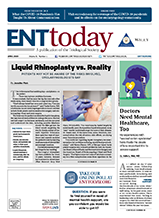Richard Smith, MD, has gone from seeing patients in his regular otolaryngology practice to assisting his institution with COVID-19 patients in newly created ICU spaces in the hospital.


Richard Smith, MD, has gone from seeing patients in his regular otolaryngology practice to assisting his institution with COVID-19 patients in newly created ICU spaces in the hospital.

Within the adolescent and millennial population, increased risk of pulmonary side effects from a COVID-19 infection could be exacerbated with the use of electronic cigarettes and vaping liquids, especially those containing THC and originating in the black market.

Clinicians who see patients with symptoms and signs of Meniere’s disease now have new guidance to improve diagnosis and treatment of the disease. In April 2020, the American Academy of […]

In response to cautious states reopening and resident needs during the COVID-19 pandemic, the American Medical Association (AMA) has released new informational and educational resources without charge. The new Physician […]

It has by now been widely reported that anosmia is a symptom of COVID-19—the CDC just added new loss of sense of smell to its list of known […]

Panelists at the Triological Society Combined Sections Meeting review complicated cases.

Revenue is likely the driver of the number of balloon dilations performed in the U.S., meeting panelists say.

Researchers share data on the Triological Society’s Career Development Awards program.

Pediatric otolaryngology is a world of its own, experts say

Otolaryngologists rely on a mix of old and new tactics to attract patients.